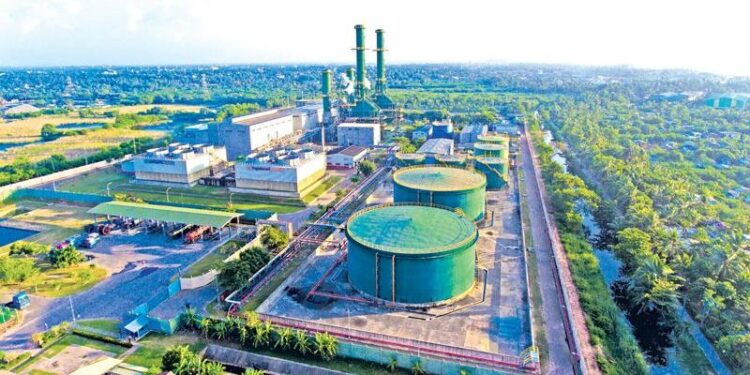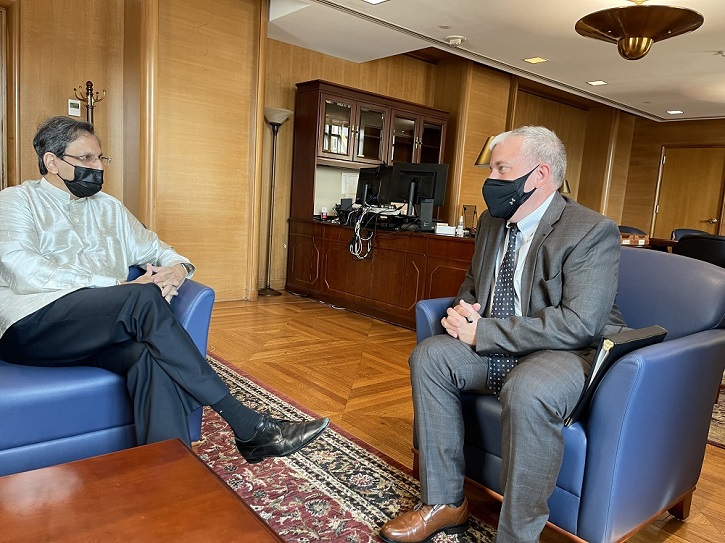
Sinhala politicians, trade unions, civil society organisations and religious leaders have all banded together to express their outrage at the Sri Lankan government’s signing of a deal with US-based firm New Fortress Energy, which will see the company acquire a 40% stake of the Yugadanavi Power Plant based in Colombo and develop a new offshore liquefied natural gas (LMG) terminal off the coast of the southern capital.
The deal, announced last month, will also give New Fortress the gas supply rights to the Kerawalapitya Power Complex. “New Fortress will initially provide the equivalent of an estimated 1.2 million gallons of LNG (~35,000 MMBtu) per day to the GOSL, with the expectation of significant growth as new power plants become operational,” said a press release from the company.
“This is a significant milestone for Sri Lanka’s transition to cleaner fuels and more reliable, affordable power,” said Wes Edens, Chairman and CEO of New Fortress Energy. “We are pleased to partner with Sri Lanka by investing in modern energy infrastructure that will support sustainable economic development and environmental gains.”

Last month, then Sri Lankan ambassador to the USA Ravinatha Aryasinha, met with the US Department of Commerce and expressed his appreciation at the deal, stating that he hoped it would “encourage other US companies to also compete and benefit from Sri Lanka’s current large scale economic development projects”.
Back on the island however, there has been widespread anger across the Sinhala south.
Within the ruling regime there have been disagreements, with leaders of 11 government’s partner parties set to meet again on Saturday with the Sri Lankan prime minister and finance minister to express their opposition to the deal.
Buddhist monk and chairman of the National Movement for the Protection of the Nation, Elle Gunawansa meanwhile has filed a Fundamental Rights petition in Sri Lanka’s Supreme Court, as well as the Colombo Archbishop Malcolm Cardinal Ranjith, claiming that the deal is “contrary to the law, arbitrary and an infringement of Fundamental Rights”.
Meanwhile, Opposition Leader Sajith Premadasa released a statement warning that awarding the contract to a “foreign private company” would jeopardise “national security”.
“Energy security in the country will be jeopardised by transferring a controlling power of a central power plant in the country, and this also endangers power generation in the country by letting a foreign company weaken LNG supply in the future,” he claimed. “No country in the world has called the tenders for supplying natural gas and for related infrastructure development jointly, because those countries are aware that such a move would not ensure national security and energy safety in the country.”
“A foreign private company will have the monopoly in generating 50% of the power requirements in the country in terms of this proposal. We urge the Government to explain reasons for offering this to a private company, even after calling tenders and the completion of evaluations, and the consequences of possible diplomatic issues likely to arise from other countries who had already forwarded tenders accordingly.”
His statement was accompanied by his Samagi Jana Balawegaya (SJB) part also filing fundamental rights petition in Sri Lanka’s supreme court.
Janatha Vimukthi Peramuna (JVP) Leader and National People’s Power (NPP) Parliamentarian Anura Kumara Dissanayake claimed that the deal was signed in secrecy in the “dead of the night”, leading to the lawmaker accuse the government of being “owls”.
“An agreement of national importance was signed at 12:06 past midnight. After that the foreigner who came for the signing went back to America on a flight at 2.00 a.m.,” he claimed.
“On September 6, the Cabinet of Ministers, which meets on Zoom these days, approved the cabinet paper presented by Rajapaksa. None of the Cabinet Ministers got the cabinet paper prior to that moment. We learnt that this was approved despite there being some opposition to it from within the Cabinet itself.”
JVP MP Sunil Handunnetti said “How can we let a foreign company, which is not under the purview of local legislation, have control over the country’s energy security?”, as he called on the public to speak out against the deal.
Sinhala nationalist parliamentarian Champika Ranawaka reportedly claimed that deal was a “surrender [of] our autonomy”
Former Petroleum and Petroleum Resources Minister, Chandima Weerakkody claimed that he had opposed such a deal eve during the previous Sri Lankan government, adding that his protests were the reason he lost his portfolio.
“I had to work according to my conscience, and I couldn’t let such an agreement proceed,” he claimed. “I was against it, and it cost me my cabinet post.”
The Ceylon Electricity Board Engineers’ Union (CEBEU) has extensively argued against the deal, claiming that it violates the government’s own National Energy Policy, which states that “considering the impact to the national energy security, operation of the first LNG terminal and LNG procurement shall be kept under state control”.
The pricing formulas which are part of the deal are also “very much disadvantageous to Sri Lanka,” it continued, stating that the contract term of five years can be extended with almost definite compelled further extensions.
“The main aim of NFE is not the mere USD 250 million investment in shares of WCPL but the securing of multi-billion dollar LNG supply contract without a competition and with exclusive rights of supplying LNG to the whole country with an undefined extended duration beyond five years with massive controlling power on the country’s national security and energy security and with guaranteed exorbitant profits,” it added
“The actual deal is in the fuel supply contract which can go up to 6,000 million US dollars and commit the CEB to unwanted LNG which may force renewable plants to be shut or pay the US company for unused gas,” CEBEU President Saumya Manawadu told reporters.
And finally, an unnamed activist told The Island, “They [the U.S.] will not let us off the hook once they establish their foothold here. We are in deep trouble.”
